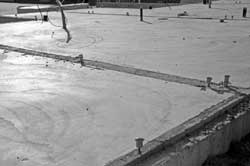Moisture-Sensitive Flooring Decides the Race Between the Tortoise and the Hare
 When a flooring fails due to moisture-related problems, nobody wins. From contractors and construction managers, flooring installers and adhesive manufacturers right down to the facility owners and users – everyone experiences the “fall out.” Schedules are disrupted, remediation efforts inflate budgets, and projects limp to completion like a tortoise with a sprained knee ligament. Clearly, professional floor installers should avoid moisture problems.
When a flooring fails due to moisture-related problems, nobody wins. From contractors and construction managers, flooring installers and adhesive manufacturers right down to the facility owners and users – everyone experiences the “fall out.” Schedules are disrupted, remediation efforts inflate budgets, and projects limp to completion like a tortoise with a sprained knee ligament. Clearly, professional floor installers should avoid moisture problems.
What to do: race your way to a finished floor like a speedy rabbit?
Prevention is worth more than the cost of a cure when it comes to concrete moisture. For most adhesive-installed flooring, prevention begins with the concrete slab.
There are numerous procedural standards for successfully pouring and drying a concrete slab. However, drying time is unique to each slab due to several factors: ambient air humidity, final service conditions, the components of the original concrete mixture, operational (or not) HVAC systems, surface finishes, floating practices, and rewetting. If any one of those elements changes during the course of the project, the concrete may not dry as expected. Entire construction schedules can be delayed based on a drying slab’s condition.
Ideally, construction projects unfold like a relay race, not a sprint. The architect hands off to the construction manager; he passes the baton to the concrete contractor; he puts the proverbial stick in the flooring installer’s hands. Each leg of the race should advance the project to its final goal: a completed facility featuring a well-installed, usable floor system. Successful flooring installation depends on quality control of potential emissions produced by the concrete’s moisture and pH levels. Installers need to protect the slab from external moisture and ensure that flooring coverings and adhesives are compatible. Getting it right may not mean getting there quickly.
When schedules are tight, builders are tempted to rush the concrete or hand off too soon to the next subcontractor. Yet, the question remains: even with desiccant drying or surface treatments, how can flooring contractors truly know that concrete moisture levels are going to work with the moisture-sensitive adhesives specified for the project?
The best answer is accurate monitoring of the relative humidity (RH) within the slab. While other test methods (such as calcium chloride testing) have been commonly used, they indicate only surface moisture conditions. RH testing measures, and accurately reflects, conditions within the slab as well as the final RH conditions after the floor is installed. Flooring installers and general contractors are empowered to exercise the most prudent installation decisions based on an accurate reading of RH conditions within the slab. Armed with that information, industry professionals can either allow the slab sufficient time to dry to adhesive specifications or choose a flooring adhesive suited to the slab’s current RH conditions.
Flooring installers and general contractors are empowered to exercise the most prudent installation decisions based on an accurate reading of RH conditions within the slab. Armed with that information, industry professionals can either allow the slab sufficient time to dry to adhesive specifications or choose a flooring adhesive suited to the slab’s current RH conditions.
The most successful flooring installers know when to run like the hare, slow like the tortoise – and when to measure like a pro. Specification requirements have a major impact on final performance. RH testing according to specifications leads flooring installers to the finish line with confidence.